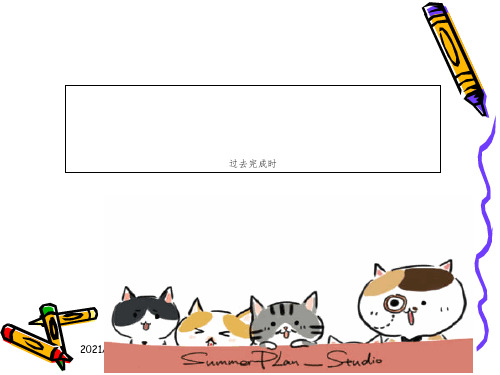过去完成时被动课件
合集下载
高中英语-过去完成时及其被动语态(共25张)-经典通用课件资料

2021/10/10
13
过去完成时被动语态的常用情况:
• (1)表示过去某一时间以前已经完成的动作,常与by, before等引导的时间状语连用。 • (2)在 told, said, knew, heard, thought等动词之后的宾语从句中,若表示过去某一被动动
作时,用过去完成时。 • (3)根据语意可以判断出动作先后的被动语态,用过去完成时。
(live) in Beijing for 8 years.
• 4、He said that he
(learn) some English before.
had sent
had lived
had learned
2021/10/10
9
• 5、I arrived late, I
(not expehcat)dtnh'et reoxapdetcotebedso icy.
had been told
2021/10/10
16
• 1、When Li Ming hurried home,he found that his mother ____already____(send) to hospital.
• 2、I thought the letter ________(send) by him a week before.
2021/10/10
18
• 1、医生到时病人已死了。 • When the doctor arrived the patient had died. • 2、我醒了,因为我做了个噩梦。 • I woke up because I had had a bad dream. • 3、我们到那里时,篮球赛已经开始了。 • When we got there the basketball match had already started. • 4、据媒体报道,有上千人在地震中丧生。 • The media reported more than 1,000 people had been killed in the earthquake.
被动语态(15张PPT)初中英语专项复习课件

主动语态变被动语态的方法
英语的谓语动词有两种状态
We 主语
speak 谓语
English. 宾语
English 主语
is spoken 谓语
by us. 宾语
主动语态变被动语态的方法
主动结构:
1 The people always open the
window.
被动结构:
1 The window is always opened by
3 主动: see sb do
被动: sb be heard to do
Lucy was heard to sing in the classroom by me.
被动: sb be seen to do
I see Jack play the basketball
改成
in the playground.
the people .
2
主动结构: They will design a new bike in the
2
被动结构: A new bike will be designed by them
factory.
in the factory.
3
主动结构: He cut down a tree.
3 被动结构:
A tree was cut down by him.
主动省略to被动还原to
1 主动: make sb do I made my sister cry.
被动: sb be made to do
改成
My sister was made to cry by me.
2 主动: hear sb do I heard Lucy sing in the classroom. 改成
被动语态PPT课件

一般过去时
肯定句结构
主语 + was/were + 动词的过去 分词 + 其他成分
否定句结构
主语 + was/were + not + 动词的 过去分词 + 其他成分
疑问句结构
Was/Were + 主语 + 动词的过去分 词 + 其他成分?
一般将来时
01
02
03
肯定句结构
主语 + will be + 动词的 过去分词 + 其他成分
01
当主动句中的宾语在被动句中变为主语时,其后的宾语补足语
相应地变为主语补足语。
保留宾语补足语
02
有些动词的宾语补足语在被动句中保持不变,仍然对主语进行
补充说明。
省略宾语补足语
03
在某些情况下,被动句中的宾语补足语可以省略,不影响句子
的意思。
双宾语句子转化为被动句
双宾语均可变主语
主动句中的两个宾语在被动句中 都可以变为主语,分别构成两个
如何区分被动语态和过去分词作定语 ?
疑难问题解答
01
哪些动词不能用于被动 语态?
02
不及物动词,如 happen, occur等。
03
04
表示状态的系动词,如 be, seem, appear等。
表示归属的动词,如 belong to, consist of 等。
THANKS
感谢观看
在不需要强调动作承受者或避免提及动作执行者的情况下,尽量使用主动语态。
在科技论文、新闻报道等正式文体中,适当使用被动语态可以增加文章的客观性和 正式度,但要避免过度使用。
06
过去完成时-英语语法课件

过去完成时的疑问句 一般疑问句句型:Had + 主语 + 过去分词...? 回答方式: Yes,主语 + had. / No,主语 + had + not.
过去完成时的疑问句是将助动词had置于主语之前(大写had的第一个字母),在句尾 加问号;这种语序是倒装语序:
I visited the museum yesterday. —Had you visited it before? —Yes,I had./No,I hadn’t. 昨天我参观了这个博物馆。 ——你以前参观过这个博物馆吗? ——是,我去过。/没有,我以前没有去过。
过去完成时的肯定句 句型:主语 + had + 过去分词...
过去完成时的肯定句由助动词had加过去分词构成:
He had already been to New York earlier in the week. 本周早些时候他去过纽约。 Jane had just left when you rang. 你打电话时简刚走。
这 时从句的动作和主句的动作发生的先后顺序已经非常明确,这时可以用一般过去时代替过去完成时。 例句: After he arrived in England, Marx worked hard to improve his English. 马克思到达英格兰之后,努力提高他的英语水平。
动词think, want, hope, mean, plan, intend等用过去完成时来表示过去未曾实现 的想法,希望,打算或意图等。
( 3 ) before + 过去的时间点。如: They had planted six hundred trees before last Wednesday. 在上星期三之前,他们已经种了六百棵树了。
被动语态ppt课件完整版

一般现在时、过去时、将来时
一般现在时被动语态
am/is/are + 动词过去分词,表示经 常性或习惯性的动作,或与现在事实 相联系的情况。
一般将来时被动语态
will be + 动词过去分词,表示将来某 一时间要发生的动作或存在的状态。
一般过去时被动语态
was/were + 动词过去分词,表示过 去某一时间发生的动作或存在的状态 。
议上讨论。)
动词形式变化规则
现在进行时
am/is/are being+过去分词。例如:The house is being repaired. (房子正在修理中。)
过去进行时
was/were being+过去分词。例如:He was being operated on when we arrived.(我们到达时他正在接受手术。)
情态动词后接完成式时,有时也可以表示虚拟语气,表示与 过去事实相反的假设或愿望。在这种情况下,句子通常使用 倒装语序,即把情态动词放在主语之前。
05Байду номын сангаас
误用与避免方法探讨
常见误用类型分析
主谓不一致
在被动语态中,主语通常是动作的承受者,谓语应与主语保持一致。然而,有时会出现主 谓不一致的错误,如“The book was wrote by him.”(正确形式应为“The book was written by him.”)
如果不定式前面的名词是对句子的主语的特点进行的说明的时候,使用不定式的主 动语态表示被动含义。
在there be句型中,当动词不定式修饰名词作定语时,不定式用主动式作定语,重 点在人。
动名词作主语或宾语补足语时
动名词作主语时,谓语动词为单数,在动名词和不定式中,作为介词的宾语是动 名词,动名词的否定直接在其前加否定词,通过代词的宾格或所有格形式给出逻 辑主语。
公开课《被动语态》ppt课件

03
was/were done,表示过去某个时间发生的被动动作。
将来时与被动语态结合
将来进行时的被动语态
will be being done,表示“将来某个时间正在被做”的动作。
将来完成时的被动语态
will have been done,表示“将来某个时间之前已经被做”的动 作。
一般将来时的被动语态
will be done,表示将来某个时间要发生的被动动作。
完成时与被动语态结合
现在完成进行时的被动语态
have/has been being done,表示“从过去一直持续到现在并 且还在被做”的动作。
过去完成进行时的被动语态
had been being done,表示“过去的过去一直持续到过去某个 时间并且还在被做”的动作。
疑问句中使用被动语态
疑问句中使用被动语态时,需要将be 动词提前至主语之前,形成疑问语序 。
疑问句中使用被动语态的结构为:Be 动词 + 主语 + 过去分词 + (by + 动 作执行者)?
疑问句中的被动语态同样用来强调动 作的执行者或不需要指出动作的执行 者。
感叹句中使用被动语态
感叹句中使用被动语态时,通常用来 表达对某个动作或状态的强烈感受。
与主动语态对比
01
主动语态
主语是动作的执行者,强调动作的执行者。
02
被动语态
主语是动作的承受者,强调动作的承受者或使宾语变为被动语态的主语,将主动语态的 谓语动词变为被动语态的“be+过去分词”形式。
常见误区及解析
A
误区一
认为所有动词都可以用于被动语态。实际上, 只有及物动词和部分相当于及物动词的动词短 语才能用于被动语态。
过去完成时ppt

例如: After he arrived in England, Marx worked hard to improve his English.
马克思到达英格兰之后,努力提高他的英语水平。
(7)动词think, want, hope, mean, plan, intend等用 过去完成时来表示过去未曾实现的想法,希望,打算或意
—Peter , where did you guys go for the summer vacation?
—We________ busy with our work for months, so we went to the beach o relax ourselves.
A. were B. have been C. had been D. will be
D.know
答案 C
解析 句意为:我们于2000年在火车上第一次相遇。我们 两人都立刻觉得我们好像已认识了好多年。that从句中 know的动作发生在句子谓语动词felt之前,因此从句谓语 动词应用过去完成时态。
7.(07安徽26)
C. am reading D. have read
----Were you surprised by the ending of the film?
----No, I _______the book, so I already knew the story?
A. was reading
B. had read
C. would do D. were doing
It took me a long time before I was able to fully appreciate what they __ for me.
马克思到达英格兰之后,努力提高他的英语水平。
(7)动词think, want, hope, mean, plan, intend等用 过去完成时来表示过去未曾实现的想法,希望,打算或意
—Peter , where did you guys go for the summer vacation?
—We________ busy with our work for months, so we went to the beach o relax ourselves.
A. were B. have been C. had been D. will be
D.know
答案 C
解析 句意为:我们于2000年在火车上第一次相遇。我们 两人都立刻觉得我们好像已认识了好多年。that从句中 know的动作发生在句子谓语动词felt之前,因此从句谓语 动词应用过去完成时态。
7.(07安徽26)
C. am reading D. have read
----Were you surprised by the ending of the film?
----No, I _______the book, so I already knew the story?
A. was reading
B. had read
C. would do D. were doing
It took me a long time before I was able to fully appreciate what they __ for me.
过去完成时ppt课件管理

同。
04
练习与巩固
选择题练习
选择题1
过去完成时的基本结构是什么?
答案
过去完成时的基本结构是“had + 过去分 词”,表示某个动作在过去某一时间之前 已经完是什么?
过去完成时表示某个动作在过去某一时间 之前已经完成,而一般过去时只表示某个 动作在过去某一时间发生或完成。
过去完成时PPT课件管理
• 引言 • 过去完成时的常见用法 • 过去完成时的特殊用法 • 练习与巩固 • 总结与回顾
01
引言
什么是过去完成时
01
过去完成时是英语语法中的一种 时态,表示某个动作在过去某个 时间之前已经完成。
02
它通常与过去某个时间点或过去 某个动作相关联,用于描述更加 具体的过去事件。
修饰过去的某个时间点
详细描述
在定语从句中,过去完成时用来修饰过去的某个时间点,表示某个动作在那个时 间点之前已经完成。例如,“The meeting that had taken place in the afternoon was a success.”(下午已经开过的会议很成功。)
在时间状语从句中
总结词
表示某个动作在另一个动作之前已经 完成
详细描述
在时间状语从句中,过去完成时用来 表示某个动作在另一个动作之前已经 完成。例如,“After he had finished his work, he went home.”(他完成工作后才回家。)
在条件状语从句中
总结词
表示某个条件下的动作
详细描述
用法二
表示某个过去的动作对于现在的情况产生了影响。例如:“I had learned the lesson before I met the teacher again.”(在再次见到老师之前,我已经吸取了教训。)
04
练习与巩固
选择题练习
选择题1
过去完成时的基本结构是什么?
答案
过去完成时的基本结构是“had + 过去分 词”,表示某个动作在过去某一时间之前 已经完是什么?
过去完成时表示某个动作在过去某一时间 之前已经完成,而一般过去时只表示某个 动作在过去某一时间发生或完成。
过去完成时PPT课件管理
• 引言 • 过去完成时的常见用法 • 过去完成时的特殊用法 • 练习与巩固 • 总结与回顾
01
引言
什么是过去完成时
01
过去完成时是英语语法中的一种 时态,表示某个动作在过去某个 时间之前已经完成。
02
它通常与过去某个时间点或过去 某个动作相关联,用于描述更加 具体的过去事件。
修饰过去的某个时间点
详细描述
在定语从句中,过去完成时用来修饰过去的某个时间点,表示某个动作在那个时 间点之前已经完成。例如,“The meeting that had taken place in the afternoon was a success.”(下午已经开过的会议很成功。)
在时间状语从句中
总结词
表示某个动作在另一个动作之前已经 完成
详细描述
在时间状语从句中,过去完成时用来 表示某个动作在另一个动作之前已经 完成。例如,“After he had finished his work, he went home.”(他完成工作后才回家。)
在条件状语从句中
总结词
表示某个条件下的动作
详细描述
用法二
表示某个过去的动作对于现在的情况产生了影响。例如:“I had learned the lesson before I met the teacher again.”(在再次见到老师之前,我已经吸取了教训。)
- 1、下载文档前请自行甄别文档内容的完整性,平台不提供额外的编辑、内容补充、找答案等附加服务。
- 2、"仅部分预览"的文档,不可在线预览部分如存在完整性等问题,可反馈申请退款(可完整预览的文档不适用该条件!)。
- 3、如文档侵犯您的权益,请联系客服反馈,我们会尽快为您处理(人工客服工作时间:9:00-18:30)。
t_.hat_________________o_u_t_.______________
3. The newspaper reported more than 1000 persons __h_a_d__b_e_e_n_k_i_l_l_e_d_____(kill) in the hurricane.
6. “想”“打算”“认为”的词用过去完成 时表示事与愿违计划未实现 want/hope/expect/ plan/mean/intend/ think/ suppose
I had intended to call on you.
practice
1. We__h_u_r_r_i_ed(hurry) to the station only to find that thehad been delayed
He said that eleven thousand people lived
there and six thousand had left a week before.
“Does this mean that the danger is over?” he asked.
He asked if this meant that the danger was
“I’m still working because there is a lot to do.” he said.
He said that he was still working because
there was a lot to do.
He said, “Eleven thousand people live here and six thousand left last week.”
over.
He often says, “China is great.” He often says (that) China is great.
“I don’t want to play football.” he said. He said (that) he didn’t want to play
mountain after they________(buy)some
food.
travels
4. He told us light______(travel)faster
than sound.
SUCCESS
THANK YOU
2019/7/9
直接引语、间接引语的转换
直接引语:直接引用别人的话,把它放在引号内. (direct speech) 间接引语:用自己的话转述别人的话 (indirect speech)
三、固定句型:
1. it was the first time that we had been introduced at the conference.
It was the first time/second time…that… 2. it was the best film that had been
train___________(delarye)alized
2. A year passed hwahdenbeeint s_e_n_t__(realize) that the parcel__________(send) to the wrboengganaddress.
3. They ______(begin)htaod bcoluigmhbt the
被动语态的过去完成时
一、过去完成时被动语态结构
过去完成时: had done
过去完成时被动语态(肯定): had been done
否定: had not been done
一般疑问句: had +主语+been done
特殊疑问句: 疑问词+had+主+been fore, after+过去时间点 表过去的过去
二、用在宾语从句中(主句是过去式,从句由 原来的
was done/have been done/had been done变 had been done
1. The tickets were sold out.
2. He hetahred tickets had already been sold
1.By the time the tornado ended, more than 700 people_____________.(kill)
2.Coghlan traveled back to Canada after he
_______________(bury) in Texas.
3. The classroomha_d__b_e_en__c_l_e_a_ne(dclean)before the teacher came.
he_h_a_d__l_e_a_r_nt____(learn) a lot.
5. 虚拟中表示与过去事实相反的动作或 者状态。
If I had been invited earlier, I would have gone there.
I would rather he hadn’t known me .
football.
1.陈述句变为间接引语,要用that引导从句,口语中常 可省略
He says, “Is Tom an Englishman?” He asked whether/if Tom was an Englishman.
He asked me“ Do you want to go?” He asked me if/whether I wanted to go.
directed by the unknown director all his life. 主语+was+the+最高级+定从
3. 自从我到这已经十年了. It is ten years since I came here. It was ten years since I had come here. 4. By the time he graduated,
3. The newspaper reported more than 1000 persons __h_a_d__b_e_e_n_k_i_l_l_e_d_____(kill) in the hurricane.
6. “想”“打算”“认为”的词用过去完成 时表示事与愿违计划未实现 want/hope/expect/ plan/mean/intend/ think/ suppose
I had intended to call on you.
practice
1. We__h_u_r_r_i_ed(hurry) to the station only to find that thehad been delayed
He said that eleven thousand people lived
there and six thousand had left a week before.
“Does this mean that the danger is over?” he asked.
He asked if this meant that the danger was
“I’m still working because there is a lot to do.” he said.
He said that he was still working because
there was a lot to do.
He said, “Eleven thousand people live here and six thousand left last week.”
over.
He often says, “China is great.” He often says (that) China is great.
“I don’t want to play football.” he said. He said (that) he didn’t want to play
mountain after they________(buy)some
food.
travels
4. He told us light______(travel)faster
than sound.
SUCCESS
THANK YOU
2019/7/9
直接引语、间接引语的转换
直接引语:直接引用别人的话,把它放在引号内. (direct speech) 间接引语:用自己的话转述别人的话 (indirect speech)
三、固定句型:
1. it was the first time that we had been introduced at the conference.
It was the first time/second time…that… 2. it was the best film that had been
train___________(delarye)alized
2. A year passed hwahdenbeeint s_e_n_t__(realize) that the parcel__________(send) to the wrboengganaddress.
3. They ______(begin)htaod bcoluigmhbt the
被动语态的过去完成时
一、过去完成时被动语态结构
过去完成时: had done
过去完成时被动语态(肯定): had been done
否定: had not been done
一般疑问句: had +主语+been done
特殊疑问句: 疑问词+had+主+been fore, after+过去时间点 表过去的过去
二、用在宾语从句中(主句是过去式,从句由 原来的
was done/have been done/had been done变 had been done
1. The tickets were sold out.
2. He hetahred tickets had already been sold
1.By the time the tornado ended, more than 700 people_____________.(kill)
2.Coghlan traveled back to Canada after he
_______________(bury) in Texas.
3. The classroomha_d__b_e_en__c_l_e_a_ne(dclean)before the teacher came.
he_h_a_d__l_e_a_r_nt____(learn) a lot.
5. 虚拟中表示与过去事实相反的动作或 者状态。
If I had been invited earlier, I would have gone there.
I would rather he hadn’t known me .
football.
1.陈述句变为间接引语,要用that引导从句,口语中常 可省略
He says, “Is Tom an Englishman?” He asked whether/if Tom was an Englishman.
He asked me“ Do you want to go?” He asked me if/whether I wanted to go.
directed by the unknown director all his life. 主语+was+the+最高级+定从
3. 自从我到这已经十年了. It is ten years since I came here. It was ten years since I had come here. 4. By the time he graduated,
